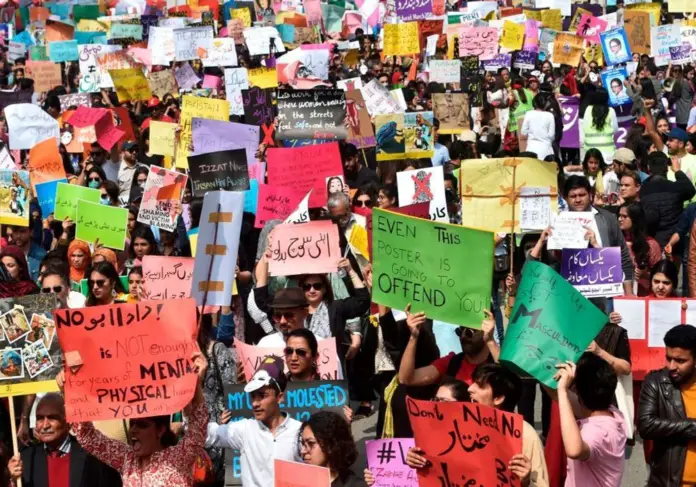Pakistan had its first ‘Aurat March’ in 2018 on Women’s Day and the slogans and placards about women’s rights created an uproar in society. That was the first time when young women came on to the streets and addressed patriarchal behavior which they face on a daily basis.
But the march gradually evolved into a social movement and people started talking more about women rights and how they feel unsafe in different sections of the society. Due to such vibrant activism, three Acts were reformed – the Anti-Rape Ordinance 2020, the Protection Against Harassment of Women at the Workplace Act, 2010, and the Child Marriage Restraint Act 1929.
Laiba Zainab, women’s rights activist and organizer of Aurat March Multan Chapter, while talking to Minute Mirror said, “Have you seen our journey? Who would have thought that we will be doing our fifth march? There are acts reformed and now we want to stop police torture.”
In Pakistan, raising voice for rights of women is mostly labelled as anti-society and anti-state activity. But increasing social media campaigns and advocacy about what women are actually marching for is creating an environment of tolerance.
Started from Karachi, the March has now spread in all the mainstream cities of Pakistan. Lahore, Peshawar, Karachi, Multan and even in Quetta, women come out on the streets and protests for their rights.
But we cannot neglect this reality that where many men join the marching women, many women are against this march or have some different ideology of women’s rights. Javeria Siddique, a journalist and columnist, while speaking to Minute Mirror, said that she was against the Aurat March when it began but with the passage of time, despite having ideological differences, she thinks that everyone has a right to put their demands forward in a healthy and balanced society.
“I did not like some of the slogans that women were raising in Aurat March, while adding so many other problems like students’ rights, labour rights, I guess they have detracted the real agenda of putting forward women’s actual rights. Cook your own food, iron your own clothes are not our problems, our problems are basic facilities of health, education, paid maternity leaves, day cares at our work places,” Siddiqui said.
She lamented the fact that there were people who wanted to create sensationalism while using the Aurat March platform. “Why we don’t see placards for free cancer treatment for women?” she raised a question. When people from different genders came together on a platform for their rights, most of the time, the debate and focus changed to other minor problems rather than addressing the main issue, she added.
“With the passage of time I think that we should behave like a tolerant society and let all the voices come forward and represent healthy society. But we have to be aware of those people or segments of the society who want to portray a negative image of our country in the name of activism,” said Siddique.
While keeping aside the debate of right and wrong, let’s see what this year’s Aurat March manifesto says. There are two sections of demands, one from the state and one from the society. Demands from the state include healthcare, economic and psycho-social services to survivors of patriarchal violence.
“We do not accept austerity-based policies which have gutted public health and welfare institutions. The criminal justice system has serious limitations, and the state cannot be allowed to absolve its responsibility towards survivors by simply providing punitive solutions,” says the manifesto. Right of clean air, more opportunities for women’s businesses and right of clean environment etc. are added in the demands from the state.
In the demands from society, the manifesto seeks to transform behaviours by giving perpetrators and harm-doers the opportunity to hold themselves accountable and repair the harm they have done.
“This work cannot be done by individuals, and certainly not by survivors, it requires structural support given to communities to reform perpetrators. Perpetrators often lack resources and language to practice self-accountability, presented with the binary of legal guilt or innocence. There is no room for reformation – the current justice system helps no one: neither does it provide meaningful justice to victims, nor does it allow for perpetrators to reckon with the harm they caused,” said the manifesto.
Along with these demands, the manifesto is also speaking to the masses about gender equality, huge pay gap between men and women working on the same post, less opportunities for women to share their traumas with their families.
“This is a huge problem when it comes to Aurat March that people do not read our manifesto properly. They just label us anti-state or anti society. Every year, the number of men supporting our cause is increasing and that is our success,” said Zainab.
Every movement takes its time to grow and reach the masses in its original essence. A balanced and healthy society hears all the segments and gives space to people to put their thoughts forward.







